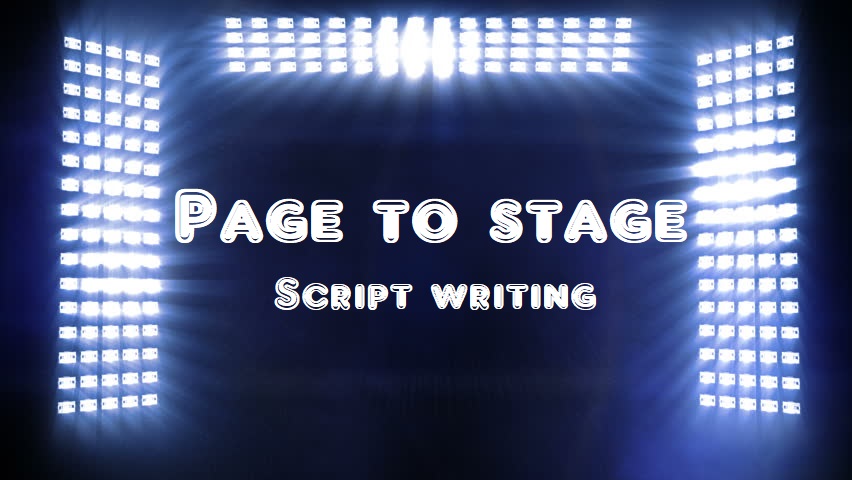Movies are sometimes regarded as the most powerful form of communication. Although they are primarily visible, their reach goes beyond what see and touches our senses. Below are four more ways a movie communicates with the audience.
- Audible
- Emotional
- Visual
- Nonverbal communication
Nonverbal communication is a delicate art. It is recognized in the subtext of the story and it allows the audience to fill in the blanks. Many writers often struggle with this aspect of screenwriting.
A great script is focused on telling a powerful story that touches the audience in each area of communication. The more senses a writer can stimulate, the clearer the message of the narrative and it grabs the audience’s attention.
Last month I mentioned how clutter can slow down a story. This month I want to focus on how saying more by writing less, helps convey a more powerful story.
Powerful Storytelling!
Many moviegoers pay to see a movie just for entertainment, but I believe there is a subconscious desire to learn or be enlightened from another perspective. Human beings are complex creations and have an innate ability to be curious. This is why we have the 5W’s (who, what, when, why, where) and a writer who want to make an impact, answers these in their story.
For me, the 5W’s are seen through the perspective of disabled or vulnerable persons and to inspire and educate others. However, I want to do it in an entertaining way, but that aspect isn’t the ultimate goal of my writing. I want my story to touch my audience below the surface. Good writers know how to appeal to the audience’s multiple senses.
I want to be clear, storytelling isn’t a formula, it’s an art with conventions that are commonly accepted, but not strictly enforced.
Below are some key tips from the Masterclass series on writing:
- Choose a clear central message: a great story usually progresses toward a central moral or message.
- Embrace conflict: as a storyteller, you can’t shy away from conflict.
- Have a clear structure: there are different ways to structure a story, but the three ingredients a story must have are a beginning, a middle, and an end.
- Mine your personal experiences: think about important experiences in your real life and how you may be able to craft them into narratives.
- Engage your audience: great storytelling requires you to connect with your audience.
- Observe good storytellers: look for good storytellers and learned through observation.
- Narrow the scope of your story: trust that your audience will be able to follow your story, don’t overwhelm them with unnecessary back story or tangential plot points.
Implementing these tips helps us communicate a clearer and more powerful story.
“Melodrama is not the result of overexpression, but of undermotivation.”
Robert McKee
My goal as a writer is to communicate a message in a powerful story because for me the message is what matters.
Message Matters!
If we as writers want to tell a narrative that makes a difference, it’s imperative to make our message clear and focused from beginning to end. I’m not saying we cannot surprise our audiences, but we have to deliver on what we promise at the beginning of our characters’ journeys.
When we fail to deliver a satisfying conclusion to the narrative, our audience feels cheated and we’ll lose their trust. We cannot use a bait and switch approach to storytelling, powerful stories deliver on what the writer promises.
I am a huge Marvel comics fan. Before my accident I acquired a huge 2000 book collection. I even have the collectible, book cards. Recently, I was able to see the new Doctor Strange movie.
Before seeing the movie I had heard some negative reviews from friends, but I went in expecting a spectacular powerful story the MCU (Marvel Cinematic Universe) has been building for over two years. Although the movie was entertaining, it went in a different direction than I expected. It seemed to focus more on political and unnecessary subplots.
Yes, like others, I left the theater feeling disappointed; especially after investing money and over two hours of my weekend to see the movie. Powerful storytelling must stay focused on its core message and keep the audience entertained. Below are some of my favorite movies that are successful at accomplishing this.
I have to confess, Glory made a huge impact on me as a kid, it was filmed about two hours from where I lived in Georgia. Before I began working on my latest screenplay I knew the message I wanted to tell, I understood it had to be visibly and emotionally stimulating; because that is powerful storytelling!

Martin Johnson survived a severe car accident with a (T.B.I.) Traumatic brain injury which left him legally blind and partially paralyzed on the left side. He is a speaker for Brain Injury Awareness of America and is an award-winning Christian screenwriter who has recently finished his first Christian nonfiction book. Martin has spent the last nine years volunteering as an ambassador and promoter for Promise Keepers ministries. While speaking to local men’s ministries he shares his testimony. He explains The Jesus Paradigm and how following Jesus changes what matters most in our lives. Martin lives in a Georgia and connects with readers at MartinThomasJonhson.com and on Twitter at mtjohnson51.





1 Comment
Good suggestions to keep in mind no matter what you write.